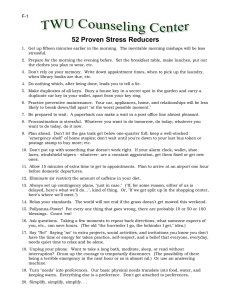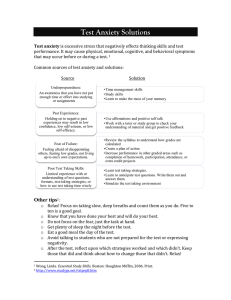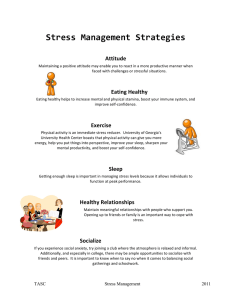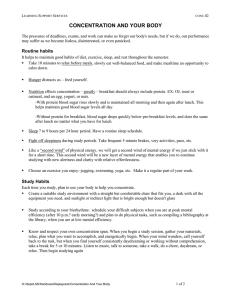Stress
advertisement
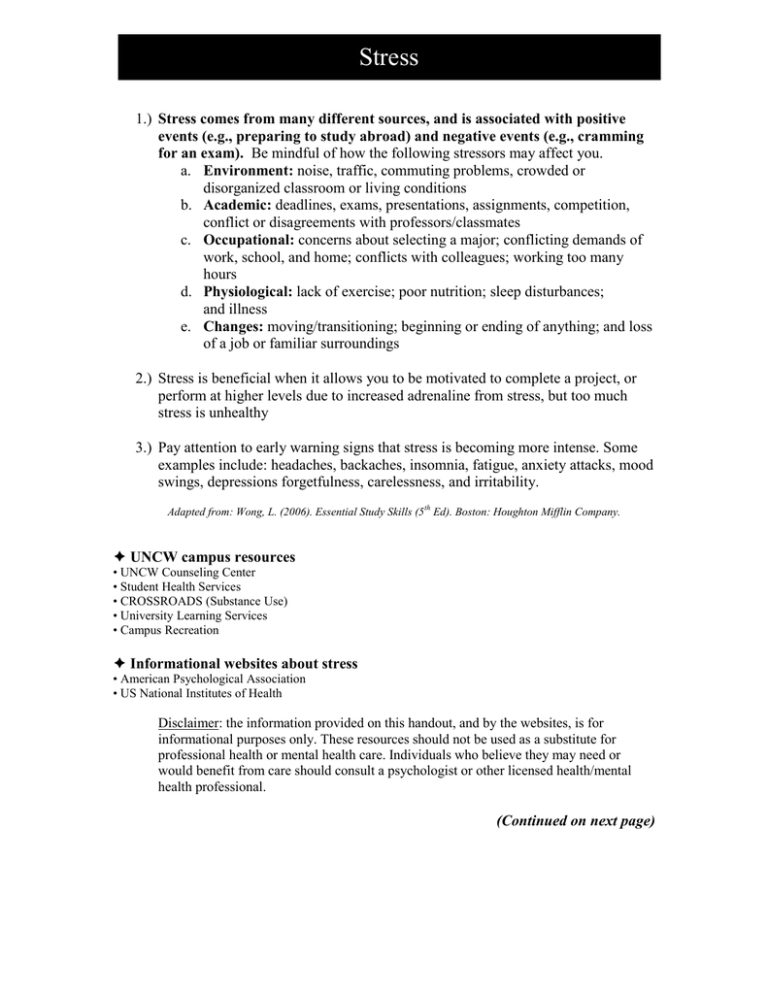
Stress 1.) Stress comes from many different sources, and is associated with positive events (e.g., preparing to study abroad) and negative events (e.g., cramming for an exam). Be mindful of how the following stressors may affect you. a. Environment: noise, traffic, commuting problems, crowded or disorganized classroom or living conditions b. Academic: deadlines, exams, presentations, assignments, competition, conflict or disagreements with professors/classmates c. Occupational: concerns about selecting a major; conflicting demands of work, school, and home; conflicts with colleagues; working too many hours d. Physiological: lack of exercise; poor nutrition; sleep disturbances; and illness e. Changes: moving/transitioning; beginning or ending of anything; and loss of a job or familiar surroundings 2.) Stress is beneficial when it allows you to be motivated to complete a project, or perform at higher levels due to increased adrenaline from stress, but too much stress is unhealthy 3.) Pay attention to early warning signs that stress is becoming more intense. Some examples include: headaches, backaches, insomnia, fatigue, anxiety attacks, mood swings, depressions forgetfulness, carelessness, and irritability. Adapted from: Wong, L. (2006). Essential Study Skills (5 th Ed). Boston: Houghton Mifflin Company. UNCW campus resources • UNCW Counseling Center • Student Health Services • CROSSROADS (Substance Use) • University Learning Services • Campus Recreation Informational websites about stress • American Psychological Association • US National Institutes of Health Disclaimer: the information provided on this handout, and by the websites, is for informational purposes only. These resources should not be used as a substitute for professional health or mental health care. Individuals who believe they may need or would benefit from care should consult a psychologist or other licensed health/mental health professional. (Continued on next page) 33 Stress Reducers 1. Get up fifteen minutes earlier in the morning. The inevitable morning mishaps will be less stressful. 2. Prepare for the morning the evening before. Put out the clothes you plan to wear, pack up your books and notes, etc. 3. Don't rely on your memory. Write down appointment times, when library books are due, etc. ("The palest ink is better than the most retentive memory." - Old Chinese Proverb) 4. Procrastination is stressful. Whatever you want to do tomorrow, do today; whatever you want to do today, do it now. 5. Don't put up with things that work improperly. If your alarm clock, wallet, shoelaces, windshield wiperswhatever-are a constant aggravation, get them fixed or get new ones. 6. Allow an extra 15 minutes to get to appointments. 7. Limit the amount of caffeine in your diet. 8. Always establish contingency plans, "just in case." ("If for some reason either of us is delayed, here's what we'll do..." kind of thing. Or, "If we get split up in the shopping center, here's where we'll meet..") 9. Relax your standards. The world will not end if you don't clean your apartment this weekend. 10. For every one thing that goes wrong, there are probably 10, 50, or 100 things that go right. Count them! 11. Ask questions. Taking a few moments to repeat back directions, what someone expects of you, etc., can save hours. 12. Say "no" to extra projects, social activities, and invitations you don't have the time or energy for. It takes practice, self-respect, and a belief that everyone, everyday, needs quiet time to relax and be alone. 13. Want to take a long bath, meditate, sleep, or read without interruption? Allow yourself to temporarily disconnect. Turn off your home phone, cell phone, pager, etc. 14. Turn "needs" into preferences. Basic physical needs include food, water, and shelter. Everything else is a preference. Don't get attached to preferences. 15. Make friends with non-worriers. If you want anxiety and worry, associate with chronic worrywarts. 16. Get up and stretch periodically when you sit for extended periods while studying or at work. 17. Buy a set of earplugs. If you need to find quiet at home, pop in some earplugs. 18. Get enough sleep. If necessary, use an alarm clock to remind yourself to go to bed, or schedule it in your planner. 19. Create order out of chaos. Organize your home/workspace so you know where things are. When you're finished using something, return it to its place - you'll be less stressed when you haven't lost something. 20. Writing your thoughts and feelings down can help you clarify things and offer a different perspective. 21. Try the following yoga technique whenever you need to relax. Inhale deeply through your nose to the count of eight. Then, with lips puckered, exhale very slowly through your mouth to the count of 16, or for as long as you can. Concentrate on the long sighing sound and feel tension dissolve. Repeat 10 times. 22. Inoculate yourself against a feared event. Example: before speaking in public, review every part of the experience in your mind. Imagine what you'll wear, what the audience will look like, how you will present, what the questions the audience will ask, etc. When you give the actual presentation, you will likely be familiar with the material, and you will be less anxious. 23. When stress of having to get a task done interrupts actually getting it done, a diversion may be just what you need (change in activity or environment.) 24. Talk it out. Discussing your problems with a trusted friend can help clear your mind of confusion so you can concentrate on problem-solving. 25. Do something that will improve your appearance. Looking better can help you feel better. 26. Schedule a realistic day. Avoid the tendency to schedule back-to-back appointments; allow time between appointments for a breathing spell. 27. Become more flexible. Some things are worth not doing perfectly, and some issues are worth compromising on. 28. Do one thing at a time. When you are busy with a project, concentrate on doing that project and put aside other things you have to do. 29. Allow yourself time, every day, for privacy, quiet, and introspection. 30. If you are faced with an unpleasant task, do it early in the day to get it over with; you will no longer have anxiety surrounding that task. 31. Forget about counting to 10. Count to 1,000 before saying anything that could make matters worse. 32. Have a forgiving view of events and people. Accept what you do and do not have control over. 33. Have an optimistic view of the world. Believe that most people are doing the best they can. Adapted from: The National Headache Foundation, 5252 N. Western Avenue, Chicago, Illinois 6062
